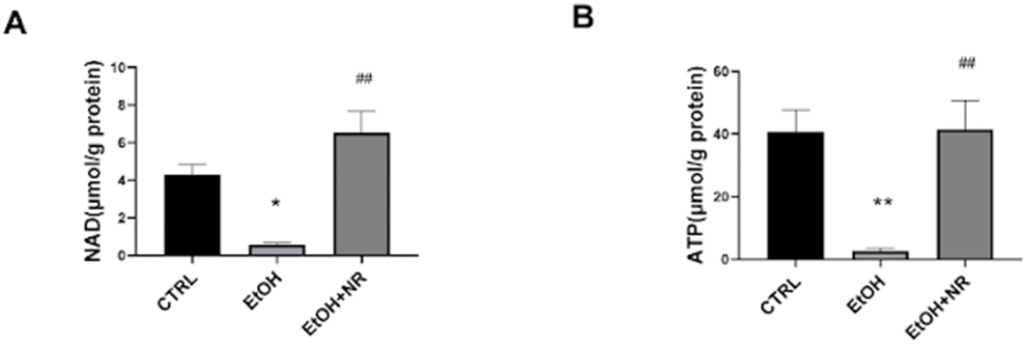Key Points:
- Alcohol induces damage to the intestinal barrier, which is prevented with NR.
- NR helps to increase the reduced NAD+ levels and energy levels seen in intestinal wall cells with excessive alcohol consumption.
- Treatment with NR increases the number of total and active mitochondria via Sirt1 – a protein involved in mitochondria production and activated by NAD+.
Dysfunction of the semipermeable barrier between the inside of the intestines and the blood supply (the intestinal barrier) has been shown to be implicated in inflammaging – the age-related increase in proinflammatory cell signals and markers. A new study shows that supplementing with nicotinamide riboside (NR) – an NAD+ precursor – may help heal the intestinal barrier, at least from alcohol-induced injury, with implications for inflammaging-related intestinal injury.
The study, borne from a collaboration between facilities in China and Norway and published in Nutrients, focused on mice with alcohol-induced intestinal injuries. The mice were given NR, which helped reduce intestinal barrier injury from binge drinking and alcoholism. Additionally, NR treatment helped maintain NAD+ balance within the body and activated Sirt1. Sirt1 is a protein that is activated by NAD+ and involved in a myriad of biological processes, including anti-inflammatory processes. Furthermore, treating the mice with NR was shown to reverse the ethanol-induced mitochondrial dysfunction – dysfunction of the cell’s powerhouse, the mitochondria, due to ethanol ingestion.
“NR acts as a good NAD precursor without side effects and is able to regulate mitochondrial function via activating the SirT1 signaling pathway…and ultimately reverse ethanol-induced damage to the intestinal epithelial barrier,” the investigators wrote.
NR for Preventing Alcohol-induced Gut Damage
The scientists split 8-week-old mice (about 20 in human years) into three groups. One group was given 5% alcohol for 10 days and then a final dose of alcohol (5 grams of alcohol per kilogram of body weight), another group was treated with the same with the addition of 400 mg/kg NR, while the final group was untreated as a control. The investigators looked at the levels of lipopolysaccharide (LPS) – a large molecule that can migrate from the intestines into the bloodstream and cause low-level inflammation – in the blood to determine how robust, or not, is the integrity of the intestinal walls.
They found that mice treated with NR, in addition to the alcohol, had decreased LPS in their blood and increased occludin and ZO-1 – two proteins that are important in maintaining the gut’s barrier – suggesting that NR can help maintain the intestinal wall barrier, despite alcohol consumption which induces injury. Furthermore, the structure of the inside of the intestines was negatively impacted in the ethanol-only group, which was not the case in those treated with NR. Similar results were seen in cell-based experiments.

NR Effects on Intestinal Barrier through NAD+ and Sirt1
NAD+ is a known affector of mitochondrial function, and having seen that NR increases NAD+ levels in the alcohol-treated mice, the researchers turned towards mitochondrial function as a possible mechanism for maintaining intestinal barrier function. The mitochondria are the cells’ main energy producers, and without ample energy, the cells lining the intestinal wall and maintaining the intestinal barrier suffer.
The investigators found that ethanol reduced the levels of proteins involved in energy production in the mitochondria, as well as reduced the number of energy molecules (ATP) in the intestinal cells of the mice. These reductions were prevented when the mice were treated with NR in addition to ethanol. Additionally, NR helped to increase both the total number of mitochondria, as well as the number of active mitochondria, both of which were reduced in the mice given ethanol alone.

Sirt1 is a protein involved in mitochondria production (in addition to other cellular processes) and is activated by NAD+. The scientists found that in cell-based studies, Sirt1 protein and activity levels were decreased with alcohol treatments, which was prevented with NR treatment. Furthermore, when the researchers prevented Sirt1 signaling, they found that NR could no longer increase mitochondrial production or increase the levels of occludin and ZO-1, suggesting that NR works to maintain the intestinal barrier through its Sirt1-dependent effects on mitochondrial function.

NR, the Intestinal Barrier, and Inflammation
Li and colleagues show that NR can help prevent alcohol-induced intestinal injury through its effects on mitochondrial function, but how does that affect the general population? Overall, the intestinal barrier has to maintain its integrity despite a constant barrage of outside insults, namely anything we ingest.
The intestinal barrier has been shown to play a role in aging and age-related inflammation. In fruit flies, barrier dysfunction has been shown to predict their impending death through its effects on metabolism and inflammatory markers. Aged primates have been shown to have both increased intestinal wall permeability and increased inflammation. As seen in this study, the intestinal wall prevents inflammatory molecules from getting into the bloodstream, but only when intact.
Whether NR, or other NAD+ precursors, such as NMN, can help prevent barrier dysfunction in humans as we age is still up in the air, but there does seem to be evidence as to the positive benefits of these supplements on barrier function and possibly aging.